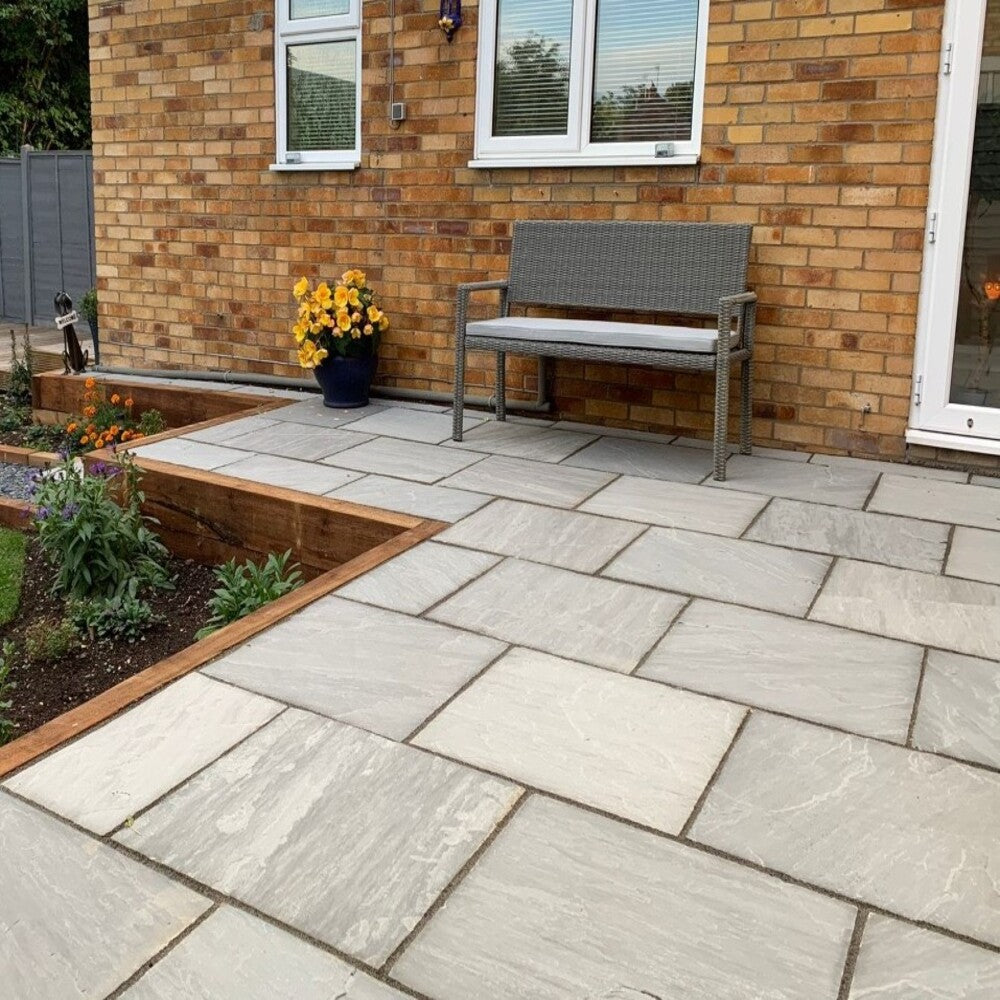Permeable paving slabs is the term for stone tiles that have a porous surface which allows water the pass through them more easily than other types of paver. This porous stone can be any of concrete, open pore pavers or even asphalt slabs. They have an underlying stone reservoir which allows for water to run through them, instead of sitting or running off of them.
You will find that permeable pavers are commonly used in carparks, high street pavements and low traffic driveways. The water flows through the stones, into the reservoir. From that it slowly and safely infiltrates the soil below or is drained off. This makes is a great eco-friendly pavement, often referred to as the green paving solution.
Natural stone and even the more modern outdoor porcelain paving are not considered permeable paving. Even an Indian sandstone - which you can see below - has a naturally pourous surface, but if you were looking to classify it as a truly "permeable stone", it does not meet the requirements to be labelled as a permeable solution. So lets take a look at what you get under a "permeable paving" label, and what might cause you to opt for something else.

The Benefits of Permeable Paving
The benefits to permeable paving are not always so obvious, we're not going to blow your mind here, but there might be a couple of things that you may not have even considered. Here are some of the reasons listed below:
- A normal paving slab which will simply be a solid chunk of stone in most circumstances, which can absorb and retain heat in the warmer months. Depending on where the sunlight falls, you can have individual areas that are warmer than others where certain slabs have retain. However permeable paving stones don’t have this effect. These ‘hot areas’ are also known as ‘heat islands’ and can be very dangerous under bare foot or for pets and other animals. But thanks to the recess and ability to drain water, they are also able to drain heat and prevent any excessively hot spots, even in the hottest weather.
- It is not commonplace at the current moment, but it is possible to find permeable paving slabs that are made from recycled materials. This puts a lot less pressure on the environment to produce new materials for pavements and driveways to be built. Generally speaking, permeable paving slabs are manufactured so the environmental cost is higher, but if you manage to find them made from recycled materials they become the greenest option available.
- Sitting water on paving in the cold weather can turn into ice and become very slippery and dangerous underfoot. As the water seeps through the pavement, there is no standing water which reduces the risk of slippery surfaces. A lot of natural stones, especially when used in combination with a permeable jointing compound should also avoid water pooling, but if you've gone for something like outdoor porcelain, this is completely impermeable so can be subject to these kind of issues.

The Drawbacks of Permeable Paving
While there are lots of advantages to permeable paving, there are some drawbacks too. We have listed these drawbacks below for you.
- Permeable paving requires extra groundwork for prep to be done to ensure proper drainage. This means two things can go wrong: 1, The installer is inexperienced and doesn't provide a permeable base rendering the slabs ineffective. or 2, an experienced installer may charge you more to prep the work. Good work doesn't come cheap!
- The maintenance needs of permeable paving are different to the maintenance needs of traditional paving. Make sure you speak to our professional paving team about the correct maintenance for this type of paving. If you attempt to maintain them in the same way as a natural sandstone, you can ruin their porosity, which defeats the point of them!
- Permeable paving stones are not as strong as traditional paving - they have a slightly more limited lifespan. Most permeable paving has a guarantee of around 10 years, so they are not a long-term/permanent option like a natural paving would be. Natural paving such as the Kota Blue limestone (below), has a lifespan of decades! Natural stone can last a life-time if you are committed to looking after it, but permeable paving will always drop-off after a number of years.

Permeable Paving Overview
It's a decision for you to make - there are a lot of benefits to it, especially in areas which see a lot of rainfall (almost the entire UK then!), but there are also reasons to consider a traditional natural stone.
Permeable stone is not something we stock - we've chosen to only provide natural or porcelain paving options as the longevity of these paving slabs are what we consider the best option. But that's not to say permeable paving doesn't have it's place.
If you've got any questions about a permeable solution, please don't hesitate to get in touch.






